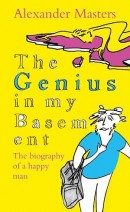A most-often weekly roundup of noteworthy reviews from other sources.
 After his prize-winning Stuart: A Life Backwards, Alexander Masters’ follow-up is another book in which the author “[finds] himself unexpectedly intimate with an unusual person” — this time, his landlord, a shut-in former mathematics prodigy. Jenny Turner says that “much of this is delightful” but “[o]ther bits get whimsical and overegged.” . . . Close on the heels of Jane McGonigal’s similarly-utopian-sounding book about the great humanitarian benefits of video games, etc., Cathy Davidson has written a paean to the awesome powers of technology. Annie Murphy Paul takes a swing at it. . . . Adam Kirsch reviews Robert Stone’s newly reissued novel Damascus Gate, a spy novel set in Jerusalem that made a splash when it was published in 1998: “A fundamentalist is someone who is exactly what he says he is. And that makes fundamentalism a terrible subject for a spy novel, where the narrative suspense comes from the reader’s uncertainty about whether anyone is what he claims to be.” . . . Richard Kahlenberg reviews a new book critical of teachers unions, and wonders if its title, Special Interest — “a term historically applied to wealthy and powerful entities such as oil companies, tobacco interests, and gun manufacturers, whose narrow aims are often recognized as colliding with the more general public interest in such matters as clean water, good health, and public safety” — can be accurately applied to the nation’s educators. . . . Matt Weiland celebrates a new edition of Robert Coover’s 1960s novel about an obsessive who creates a fantasy baseball game: “The genius of the novel is in how Coover revels in the sun-bright vitality of the world Waugh has created, full of drink and lust and dirty limericks and doubles down the line — and yet brings Waugh face to face with its darkest truths.” . . . Andrew Gamble reviews a new book about the U.K.’s demonized working class, or chavs. . . . Richard Rayner’s “Paperback Writers” column, recently discontinued by the Los Angeles Times, re-emerges at the Los Angeles Review of Books, with a look at the shorter fiction of Rudyard Kipling.
After his prize-winning Stuart: A Life Backwards, Alexander Masters’ follow-up is another book in which the author “[finds] himself unexpectedly intimate with an unusual person” — this time, his landlord, a shut-in former mathematics prodigy. Jenny Turner says that “much of this is delightful” but “[o]ther bits get whimsical and overegged.” . . . Close on the heels of Jane McGonigal’s similarly-utopian-sounding book about the great humanitarian benefits of video games, etc., Cathy Davidson has written a paean to the awesome powers of technology. Annie Murphy Paul takes a swing at it. . . . Adam Kirsch reviews Robert Stone’s newly reissued novel Damascus Gate, a spy novel set in Jerusalem that made a splash when it was published in 1998: “A fundamentalist is someone who is exactly what he says he is. And that makes fundamentalism a terrible subject for a spy novel, where the narrative suspense comes from the reader’s uncertainty about whether anyone is what he claims to be.” . . . Richard Kahlenberg reviews a new book critical of teachers unions, and wonders if its title, Special Interest — “a term historically applied to wealthy and powerful entities such as oil companies, tobacco interests, and gun manufacturers, whose narrow aims are often recognized as colliding with the more general public interest in such matters as clean water, good health, and public safety” — can be accurately applied to the nation’s educators. . . . Matt Weiland celebrates a new edition of Robert Coover’s 1960s novel about an obsessive who creates a fantasy baseball game: “The genius of the novel is in how Coover revels in the sun-bright vitality of the world Waugh has created, full of drink and lust and dirty limericks and doubles down the line — and yet brings Waugh face to face with its darkest truths.” . . . Andrew Gamble reviews a new book about the U.K.’s demonized working class, or chavs. . . . Richard Rayner’s “Paperback Writers” column, recently discontinued by the Los Angeles Times, re-emerges at the Los Angeles Review of Books, with a look at the shorter fiction of Rudyard Kipling.

